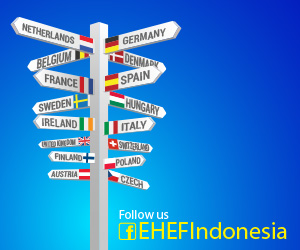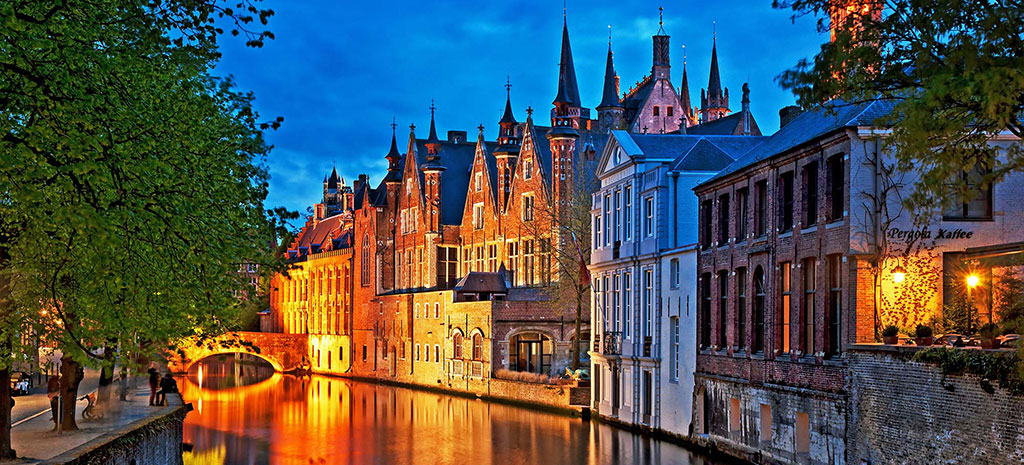
Study in Belgium
Last edited on 04 Mar 2026
Hi! Welcome to Belgium!
Home to the European Parliament, the European Commission, the European Council, and other European Union institutions as well as international organizations such as the NATO, Belgium has a friendly, cosmopolitan, and international society right in the heart of Europe. Belgium, one of the founding members of the European Union, also hosts world renowned higher education institutions. No matter you plan to study in Belgium a Bachelor's, Master's or PhD degree, or enroll in a summer study abroad program, the Belgian educational system is designed to provide students with a wide range of subjects and study opportunities. While the usual languages of instruction are French and/or Dutch, you will also find many degrees offered in English, German or any other foreign language that target international students.
The country prides itself on its medieval art cities such as Antwerp, Bruges, Ghent, Liège, Mons and Tournai. Due to its central location and its excellent transport system the other megalopolises of Western Europe such as London, Paris, or Amsterdam, are only a one or two hours train journey away. The capital Brussels is one of the world’s great multicultural cities, home to the main institutions of the European Union, with a very high number of Embassies, international organisations and multinational companies, and a large and diverse expat community.
In short, here are the reasons to study in Belgium: world-renowned universities, excellent opportunities for international networking, famously multicultural and multilingual cities, a host of regional cuisines and specialties, beautiful countryside, overall high quality of life, and, of course, those fantastic Belgian waffles.
Higher Education System
Belgium’s educational institutions, of which some date back to the middle Ages, are known worldwide for their outstanding academic reputation. They offer the broad range of study subjects from bioengineering to fine arts, from aeronautics to nuclear medicine. There are three types of higher education institutions in Belgium: universities, university colleges and postgraduate training institutions. An ever growing number of institutions of higher learning provides programmes in English. The higher education system in Belgium is part of the so-called European Higher Education Area and comprises three ‘cycles’: the first encompasses Bachelor programmes, the second, Master programmes, and the third, PhDs.
A student who has obtained a Bachelor degree can immediately supplement it with a second ‘cycle’ of studies, i.e. a master degree, consisting of at least 60 and in many cases 120 ECTS credits. Master programmes entail interaction between teaching and research and aim to provide students with advanced knowledge and skills in a specific field. The Master programme concludes with a dissertation. An Advanced master degree involves acquiring a specialised professional qualification. Advanced Master programmes are worth at least 60 ECTS credits and are rounded off with a Master’s dissertation, which forms an important part of their assessment.
Meanwhile, a Postgraduate programmes aim, within the framework of further vocational training, to broaden and/or consolidate the skills acquired following a Bachelor or master programme. A certificate is issued after a programme comprising at least 20 ECTS credits. Lastly, a PhD is the highest qualification awarded by universities in Belgium. As well as preparing for their thesis, PhD students take a PhD training programme in order to acquire additional skills that could be useful in their subsequent career in academia or elsewhere. Belgium is a popular destination for International students. Educational standards in Belgium are high, and 7 Belgian universities recently featured in the Global Top 400 of the Times Higher Education World University Rankings 2015-2016, of which 4 are in the Top 200 – the highest of which are KU Leuven ranked 35 and Ghent University ranked 118
Student Cities in Belgium
Brussels
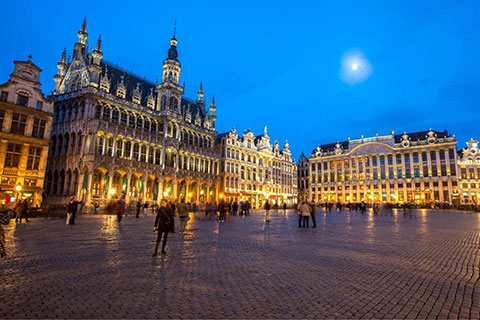
Ibukota Belgia seringkali dikatakan sebagai ibukota Eropa, hal ini dikarenakan banyak organisasi internasional yang menyataan Brussel sebagai rumah mereka. Semenjak perang dunia II, kota ini telah menjadi pusat administrasi dari beberapa organisasi termasuk Uni Eropa, NATO, WCO, dan EUROCONTROL, beberapa nama tersebut adalah sedikit dari organisasi yang berpusat di Brussel. Jadi, apabila anda ingin mempelajari politik, hubungan internasional, atau mungkin pendidikan penerjemah, Brussel mungkin merupakan kota yang tepat.
Kota ini bahkan melebihi reputasinya sebagai pusat administrasi dan birokrasi, kota ini menawarkan kehidupan malam yang berkembang, restoran tingkat dunia, kafe, bistro dan bar, dan pengalaman unik beberbelanja termasuk pasar terbuka dan galeri - yang mana itu bersejarah, sebuah jalan pusat perbelanjaan. Walaupun lebih kecil dari banyak ibukota Eropa, Brussel yang kosmopolitan dan multilingual menawarkan banyak dalam hal budaya dan rekreasi.
Universitas ternama di Brussel, termasuk universitas berbahasa Belanda Vrije Universiteit Brussel (VUB), menduduki peringkat 182 di QS World University Rankings® 2016-2017, dan universitas berbahasa Prancis Université Libre de Bruxelles (ULB), menduduki peringkat 216. Dikarenakan nama dari kedua universitas ini apabila diterjemahkan dalam bahasa Inggris menjadi "Free University of Brussels", maka jarang sekali nama tersebut diterjemahkan dalam bahasa Inggris. Universitas terkemuka yang lain di Brussel, termasuk Facultés Universitaires Saint-Louis, Hogeschool-Universiteit Brussel and the Royal Military Academy. Beberapa universitas internasional juga mempunyai kampus di Brussel, termasuk University of Kent’s Brussels School of International Studies dan Boston University Brussels.
Leuven
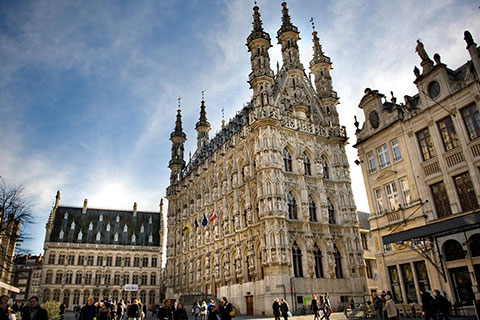
Merupakan rumah bagi grup penyulingan terbesar (Anheuser-Busch InBev), dan salah satu rumah sakit terbesar di Eropa, (UZ Leuven), Leuven juga dikenal dengan bangunan abad pertengahan yang megah, festival music musim panas tahunan Martrock, dan Arenberg Orchestra yang terkenal, salah satu dari banyak orkestra yang ada di Leuven. Kota ini juga mempunyai budaya bir yang kaya, dengan bar-bar yang menawarkan banyak variasi bir lokal dan internasional – termasuk satu bar yang menyatakan bahwa mereka menawarkan lebih dari 3000 macam bir! Pastikan anda mengunjungi Oude Markt dan sejumlah pub, bar, kafe, yang telah mendapatkan julukan “bar terpanjang di dunia”. Pada saat anda disana, juga tengok sebuah titik didekat sana Fons Sapientiae (air mancur kebijaksanaan), sebuah simbol terkenal dari status Leuven sebagai kota pelajar.
Pada saat masa belajar, pelajar merupakan mayoritas dari kota ini. Leuven menjadi rumah dari universitas Belgia dengan peringkat tertinggi, Katholieke Universiteit Leuven (yang pada saat ini menduduki peringkat 79 di QS World University Rankings). Dikenal pula sebagai KU atau University of Leuven, ini adalah universitas terbesar di Belgia, dengan jumlah pelajar 57,300 orang. Universitas ini juga dipercaya sebagai universitas tertua di Belgia, dan universitas Katolik tertua di dunia yang masih ada sampai saat ini.
Universitas lain di Leuven termasuk Vlerick Business School (sebuah sekolah manajemen, kerjasama antara Katholieke Universiteit Leuven dan Ghent University), juga beberapa universitas vokasi seperti Katholieke Hogeschool Leuven (KH Leuven), dan university college Groep T (Group T), yang menawarkan jurusan teknik dan keguruan. Leuven juga menjadi rumah dari salah satu konservatori terkenal di Belgia, Lemmens Institut, yang terkenal dengan program terapi musiknya.
Liège
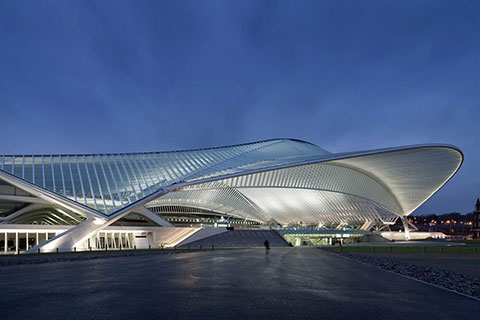
Liège adalah sebuah kota industri di Wallonia, menjadi pusat ekonomi daerah dan kebudayaan. Sementara industri utama adalah batu bara, besi, dan pembuatan senjata, Liège juga terkenal dengan festival budaya yang ramai, kehidupan malam, festival jazz tahunan, pemutaran film alternatif, dan sebagai penyelenggara pasar Natal tertua dan terbesar di Belgia. Kota ini juga dikenal sebagai salah satu penyedia industri jasa digital, teknologi, dan berorientasi internet yang terkuat di Eropa.
Atraksi lain di Liège termasuk juga beberapa museum, arsitektur abad ke – 16 dan ke – 17, 400 anak tangga “Montagne de Bueren”, dan festival Santo Nikolas – yang diorganisir oleh dan untuk mahasiswa, mencakupi berkostum jas lab yang kotor dan mengemis uang untuk minum. Liège mempunyai kawasan pejalan kaki yang dikenal dengan sebutan “The Square” dimana anda dapat menemukan banyak pub, dan kebanyakan buka sampai jam 6 pagi – atau sampai pelanggan terakhir pergi. Liège juga merupakan rumah bagi komunitas Italia yang besar, disusul dengan sejumlah besar imigran Maroko, Algeria, dan Turki.
Kota ini merupakan pusat pendidikan, tempat bagi 20,000 pelajar, lokal maupun internasional. Universitas Liège mendapatkan peringkat 315 di QS World University Rankings 2016-2017, dan juga terkenal dengan HEC Management School-nya. Institusi pendidikan tinggi yang terkemuka lainnya adalah ISA Lambert Lombard (Fakultas Arsitektur University of Liège), the Académie Royale des Beaux-Arts de la Ville de Liège (sekolah seni, menawarkan program s1 dan s2), dan La Haute Ecole de la Province de Liège (kampus yang menawarkan program s1 dan s2).
Antwerp
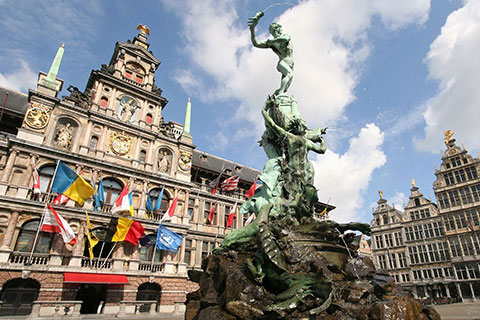
Kota kedua terbesar di Belgia, Antwep dikenal dengan pelukis Flemish Sir Peter Paul Rubens, berlian (lebih dari 70% berlian diperdagangkan di Antwerp), fashion (catatan khusus, Antwerp Six), dan pelabuhan terbesar kedua di Eropa. Kota ini juga menawarkan banyak atraksi menarik, termasuk didalamnya Gothic Cathedral of Our Lady dan the prestigious Royal Fine Art Museum, juga banyak bangunan bersejarah dari periode berbeda. Bahkan kebun binatang Antwerp, salah satu yang tertua di dunia, yang megah dengan desain dan arsitektur abad ke 19.
Seperti yang diharapkan dari asosiasi kuat kota ini dengan fashion, Antwerp dikenal sebagai trend-setter. Cendikiawan, aktor, musisi, penulis, dan pelukis menghabiskan waktu mereka di bar, kafe, dan toko trendi di kota ini – atau, menikmati pertunjukan jazz yang bertebaran. Antwerp juga terkenal untuk produk lokalnya seperti Bolleke (bir Amber), Elixir D’Anvers (minuman keras lokal), dan biskuit yang dibentuk dengan tangan (berhubungan dengan cerita rakyat lokal).
Diantara universitas di Antwerp, yang paling terkemuka adalah University of Antwerp, dengan peringkat 209 di QS World University Rankings, dan 14,000 pelajar yang terdaftar, universitas terbesar ketiga di daerah Flemish. Antwerp juga mempunyai beberapa universitas ilmu terapan, termasuk Charlemagne University College (Karel de Grote Hogeschool), Plantin University College (Plantijn Hogeschool), dan Artesis University College Antwerp.
Bruges
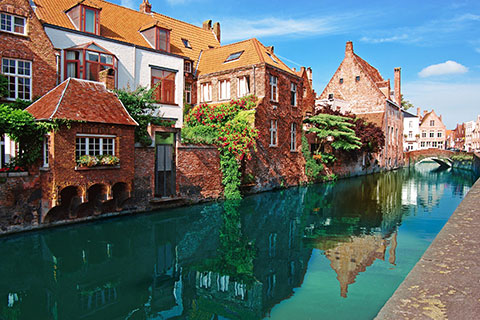
Bruges dikenal sebagai salah satu kota abad pertengahan yang paling terawat di Eropa Barat, dan pusat kota historisnya adalah situs warisan dunia UNESCO. Kanal sempit dan bangunan kuno di Bruges terkadang membuatnya dikatakan sebagai “Venesia di Utara”. Kota ini juga mempunyai banyak bangunan terkenal dan bangunan penting, termasuk menara lonceng abad 13 yang mengagumkan. Bruges juga mempunyai koleksi seni abad pertengahan dan modern awal, sejalan dengan banyak teater, gedung konser, museum, dan bioskop. Kota ini merupakan tuan rumah dari berbagai festival kebudayaan, music, dan makanan, serta merupakan kota awal untuk salah satu event olahraga terbesar di Belgia – the Tour of Flanders cycle race.
Dengan banyaknya pengunjung yang memberikan Bruges seakan seperti kota turis, disana juga banyak pelajar. Kota ini adalah pusat penting pendidikan, dengan universitas terkemuka di Bruges, termasuk Katholieke Hogeschool Brugge-Oostende (KHBO) dan the Hogeschool West-Vlaanderen (HOWEST – Howest University dalam bahasa Inggris). Bruges juga kampus utama untuk College of Europe, yang menawarkan paska sarjana dengan fokus ekonomi Eropa, hukum dan politik. United Nations University Institute on Comparative Regional Integration Studies (UNU-CRIS), sebuah institut penelitian dan pelatihan dari United Nations University juga berada di Bruges.
Application, Fees and Visas in Belgium
Applying to universities in Belgium
In order to apply to study in Belgium at undergraduate level, you must hold a secondary school leaving certificate that is recognized by the relevant authorities, or an equivalence statement for that certificate. There are different authorities to contact for equivalence statements, depending on whether you’re applying to attend a university in the French Community, in the Flemish Community, or in the German-speaking Community.
Applications to study in Belgium are submitted individually to each university, and specific admissions requirements are set by each institution. In general, those wanting to study medicine/dentistry, arts, management and (only in the French Community) engineering sciences must take an entrance exam. You may also need to take an exam to prove your proficiency in French or Dutch. You’ll also need to pay your tuition fees before you can be fully enrolled.
Tuition fees in Belgium
For Belgian and other EU students, higher education is financed mostly by the state. Nonetheless, students must pay an annual registration fee, for every year of their studies. The amount varies depending on the higher education institution, the type of program and students’ eligibility for financial aid.
Tuition fees in Belgium also differ depending on whether the program is offered by an institution in the Flemish, German-speaking, or French community. Students from the EU will pay a maximum of €835 (~US$910) per year, while international students from outside the EU will pay €835-4,175 (~US$910-4,560) and may need to pay additional registration fees – again, the amount depends on the institution and program. You can obtain specific information about the total fees amount by contacting your chosen institution(s).
Student accommodation in Belgium
University accommodation in Belgium is often readily available for short-term or international students; however, if you wish to rent a private flat, it’s often necessary to sign a one-year contract. Expect to pay between €150 (US$200) and €400 (US$540) per month, depending on whether you prefer university housing or private accommodation, and depending on where you study in Belgium. If you rent your own one-bed apartment, this is likely to cost around €675 (~US$740) per month in a city center, or €500 (~US$550) outside the center.
Home-stays are also popular in Belgium, and give students a chance to learn about Belgian culture first-hand, while possibly improving their language skills. However, this option is more commonly used by short-term students who are, for example, studying in a language school. Contact your university’s student support services or international student department for further information on finding student accommodation in Belgium.
Fast fact
- Official name: Kingdom of Belgium
- Capital city is Brussels – the headquarters of the European Union (EU) and the North Atlantic Treaty Organization (NATO)
- Constitutional monarchy, parliamentary democracy and unique federal government
- Official languages: French, Dutch and German
- The Flemish region (Flanders), the Walloon region (Wallonia) and the Brussels-Capital region each have autonomous regional administrations.
- Three language communities: the Flemish (a form of Dutch) Community in the north, the French Community in the south, and the German-speaking Community in the east
- Borders with France, Germany, Luxembourg, the Netherlands and the North Sea
- Major exports include machinery and electrical equipment, chemicals, finished diamonds, metals and metal products, and foodstuffs.
- Known for delicious chocolates, waffles, French fries and a huge selection of beers
- Currency: Euro (€)
- Major religion: Christianity (Roman Catholic, Protestant)
- An estimated 99% of the adult population is literate.
- More castles per square mile than any other country
- Blankenberge in the Flemish region hosts the largest sand sculpture festival in the world.
- Internet domain: .be








